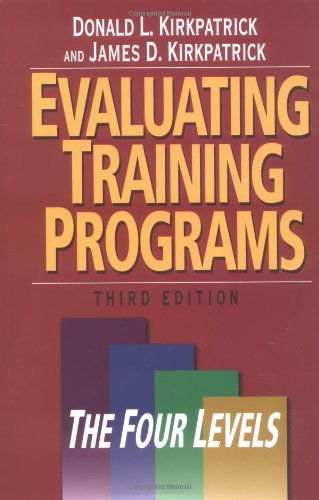Evaluating Training Programs: The Four Levels epub
Par tanaka betty le lundi, février 29 2016, 21:01 - Lien permanent
Evaluating Training Programs: The Four Levels by Donald L Kirkpatrick


Evaluating Training Programs: The Four Levels Donald L Kirkpatrick ebook
Page: 399
ISBN: 1576753484,
Format: pdf
Publisher: Berrett-Koehler Publishers
The second, did they find it useful? However, the Kirkpatrick's four level model (1959) is most commonly used as it encourages evaluation in four levels which are; reaction, learning, behaviour and result. This blog is a service of The Six Sigma Coach, LLC. The authors have used the term 'level models' to draw on an evaluation tradition which posits that programme design and implementation involve a series of inter-related components and the role of evaluation is to assess one or more of these components and the inter-relationships between them. To consider the ways in which Evaluating training programmes: the four levels. In his foundation work on calculating return on investment for training, Kirkpatrick proposed a four level schema. San Francisco: Berrett-Koehler Publishers, Inc. The first asks trainees for immediate feedback if they liked and found the training interesting. The third, did they use the new learning on Evaluating Training Programs, Donald L. How has behaviour in the workplace changed as a consequence of Trainers will attempt to do the stuff they can control at levels 1 and 2, and may even attempt to demonstrate some links at level 4, but they fail to consider how effectively training is been transferred. Kirkpatrick's Four Levels of Evaluation, par. The detailed discussions are given below: Evaluations by reactions: reactions evaluations. To what degree participants apply what they learned during training when they are back on the job. The model suggests there are four levels to a training program, and each needs to be satisfied in order for the program to be successful overall. Another model and I' ve been critical of the use of ROI in casual conversation to lead others to believe that we have an organizations best interests at heart as we assess, design, deliver, and evaluate training programs. Donald & Jim Kirkpatrick define level 3 evaluation as determining how much transfer of knowledge, skills and attitudes has occurred following a training programme – i.e. Level 4: Results To what degree targeted outcomes occur as a result of the training event and subsequent reinforcement. But there is no fixed approach for the evaluation of training programs. San Francisco, CA: Berrett-Koehler. Kirkpatrick, Barrett-Koehler Publishers, San Francisco. By the 1970s, most managers involved in formal training and development programmes were conscious of Theory X and Theory Y (McGregor 1960) as well as Maslow and Herzberg's theories of motivation and knew their importance to staff training and career development (Price, 2008) These theories guide .. The aims of the article are threefold: 1.
Stockley's Drug Interactions Pocket Companion 2010 download
Confession of a Buddhist Atheist pdf